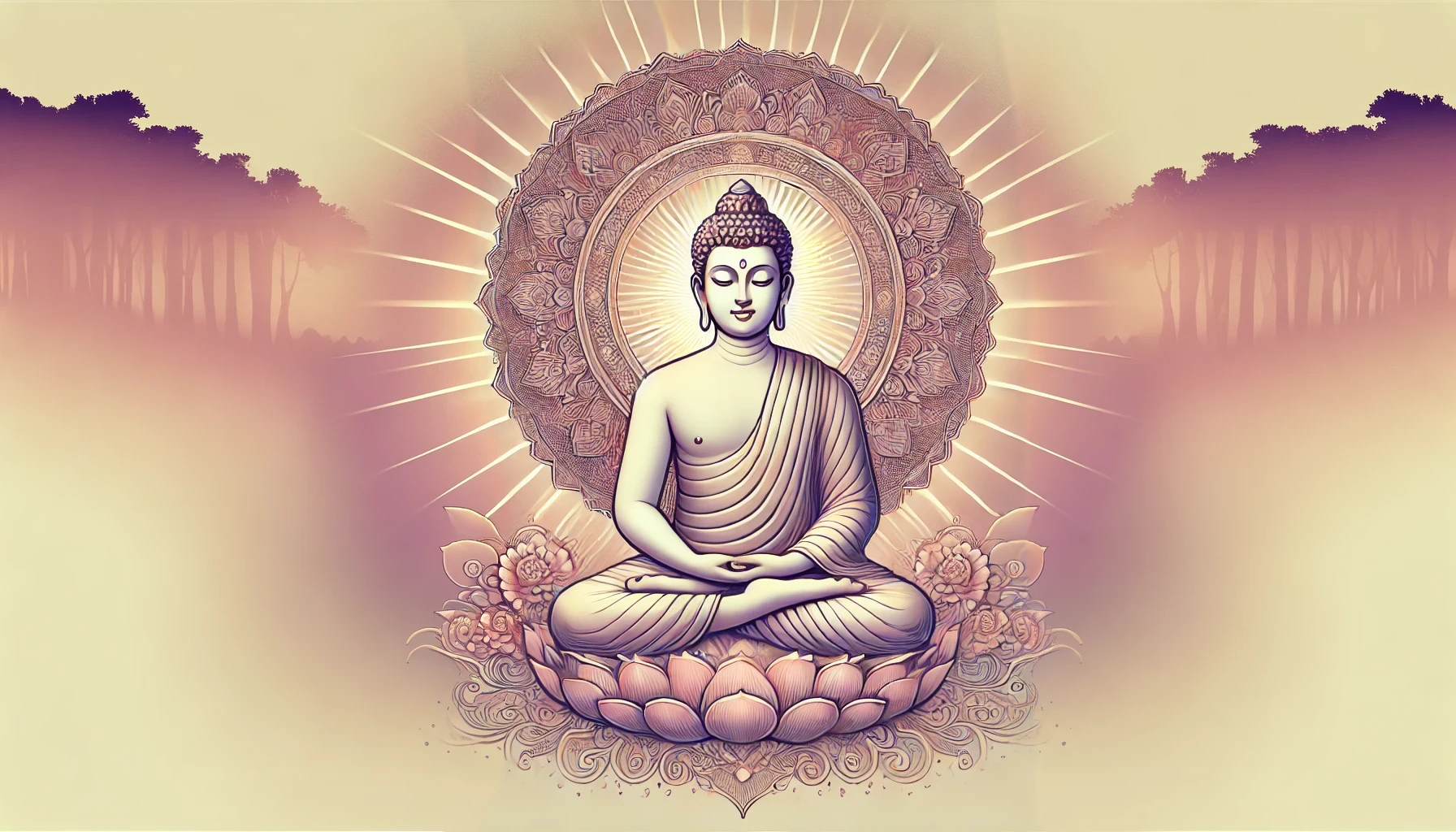In the pursuit of inner peace and mental resilience, understanding and controlling our reactions to external stimuli is essential. Param Gurudev emphasises the significance of slowing down our reactions and nurturing a state of calm awareness. This guide delves into the teachings of Param Gurudev, offering insights on how to achieve this state through the purity of knowledge and self-realisation.
Understanding Pure Knowledge

The journey towards enlightenment and self-realisation hinges upon the purity of knowledge, which can manifest as either pure or impure. Pure knowledge arises from a state of self-awareness, unencumbered by the shackles of attachment (राग) and aversion (द्वेष). It is a form of introspective understanding, untainted by the influence of external objects or phenomena. Conversely, when knowledge is directed outwardly, towards the material world, it becomes susceptible to the distorting effects of these very emotions – attachment and aversion.
The pursuit of worldly objects often breeds an unhealthy clinging or aversion, thereby obscuring the clarity of perception and leading to a state of ignorance. Thus, the path to liberation lies in cultivating pure knowledge, a state of heightened self-awareness devoid of these afflictive emotions, allowing one to transcend the cycle of attachment and aversion, and ultimately attain the sublime state of self-realisation.
The Transformation of Knowledge

Knowledge, in its purest form, is a radiant light illuminating the depths of self-awareness; however, when tainted by the turbulent currents of attachment and aversion, it undergoes a profound transformation, devolving into the murky waters of ignorance. Consider the simple act of appreciating a beautiful flower – what begins as an objective observation of its exquisite form and hue can swiftly metamorphose into an entanglement of desires and judgments.
The fragrance may ignite an intense attachment, a desperate craving to possess and prolong the fleeting experience, or conversely, breed dissatisfaction and aversion if the scent fails to meet one’s expectations. This instantaneous shift from pure, untainted knowledge to an emotionally charged response is the insidious root from which ignorance sprouts, obscuring the clarity of perception and ensnaring the mind in a web of delusion. True knowledge, therefore, must be a bastion of unwavering self-awareness, impervious to the distortions of attachment and aversion, allowing one to navigate the world with the uncompromising clarity of an unperturbed lake reflecting the boundless sky.
Vardhaman’s Realisation

Despite being born into opulent royal surroundings, Vardhaman questioned the fleeting nature of worldly pleasures and material comforts from an early age. Amidst the luxuries of the palace, his inquiring mind sought a deeper, more profound understanding that transcended the superficial trappings of his privileged existence. Vardhaman’s unrelenting spirit of introspection and self-inquiry compelled him to embark on a transformative journey of self-discovery.
Through intense contemplation and a commitment to unravelling the mysteries of existence, he gradually shed the veils of ignorance that had obscured his vision. This arduous path ultimately culminated in his enlightenment as Lord Mahavir, a state of pure, unencumbered self-realisation. Vardhaman’s extraordinary life exemplifies the power of questioning societal norms, challenging conventional notions of fulfilment, and engaging in tireless self-examination to unveil the radiant truth lying dormant within.
Transient Pleasures and True Awareness

Param Gurudev astutely observes that the vast majority of people exist in a state of ignorance, perpetually chasing after fleeting pleasures that offer mere temporary gratification. Whether it be the sensory delights of exquisite cuisine, the shallow allure of fashionable attire, or the accumulation of material possessions, these pursuits ultimately prove unsatisfying, as the pleasure they provide is inherently transient and impermanent.
True awareness, on the other hand, arises from a profound recognition of the impermanent and ever-changing nature of such worldly indulgences. It stems from a realisation that lasting fulfilment cannot be found in the ephemeral realm of sensory pleasures, but rather, lies in turning one’s gaze inward, towards the eternal and unchanging essence of the self. By shifting our focus away from the turbulent currents of desire and attachment, and anchoring ourselves in the unwavering bedrock of self-awareness, we transcend the perpetual cycle of craving and dissatisfaction, allowing the radiant light of true understanding to illuminate our path.
Differentiating Between State and Existence
A central tenet of Param Gurudev’s teachings lies in the profound distinction between states (अवस्था) and existence (अस्तित्व). States, by their very nature, are fleeting and impermanent – mere temporary conditions that arise and dissolve like waves upon the ocean. Our emotional states, physical states, and even the various roles and identities we assume throughout life’s journey, are all transient and ever-changing. Existence, on the other hand, refers to the eternal, unchanging essence of the soul – the fundamental ground of being that underlies and transcends all temporal states.
By cultivating a deep understanding of this pivotal distinction, one can maintain an unwavering state of equanimity, no longer being swayed or buffeted by the turbulent vicissitudes of circumstance. For when we anchor our awareness in the bedrock of existence, recognizing the ephemeral nature of all states, we become like an immovable mountain amidst the shifting winds of change, rooted in an abiding sense of inner peace and self-realisation.
Wisdom in Slow Reactions

Param Gurudev emphasises the importance of controlling our reaction speed and reflecting on the impermanence of states. Wise individuals cultivate a slow reaction time, responding thoughtfully rather than impulsively. This is a sign of mental resilience and inner peace. In contrast, those driven by attachment and aversion react quickly, leading to suffering. To develop mental strength, one must constantly contemplate the transient nature of all conditions. By detaching from impermanent states and focusing on the eternal self, emotional reactions are reduced, and a state of calm awareness is fostered
Reflecting on Impermanence
To fortify one’s mental resilience, it is essential to engage in constant contemplation of the impermanent nature of all states and conditions. By deeply understanding the transient quality of phenomena, one can gradually detach from the allure of fleeting circumstances and realign one’s awareness with the eternal, unchanging essence of the self. This practice serves to temper emotional reactivity, fostering an abiding state of calm, centred awareness.
Integrating Awareness
Lord Mahavir’s teachings highlight the profound integration of recognizing both the transient states of existence and the eternal essence of being. His philosophy underscores the importance of maintaining equanimity by developing an acute awareness of the impermanent nature of circumstances, emotions, and experiences, while simultaneously cultivating an unshakable connection with the timeless consciousness that transcends the ephemeral realm. This holistic understanding empowers the individual to navigate the ever-changing tapestry of life with grace, wisdom, and an unwavering sense of inner peace. It is through this harmonious embrace of the temporal and the eternal that true knowledge and self-realisation are attained, liberating the soul from the bondage of ignorance and opening the path to spiritual enlightenment and the realisation of one’s true, infinite nature..
Conclusion
In conclusion, Param Gurudev’s teachings provide a comprehensive guide to cultivating mental strength and inner peace. By understanding the nature of pure knowledge, differentiating between states and existence, and controlling our reactions, we can achieve a state of calm awareness. This path not only leads to personal liberation but also fosters resilience in the face of life’s challenges.





